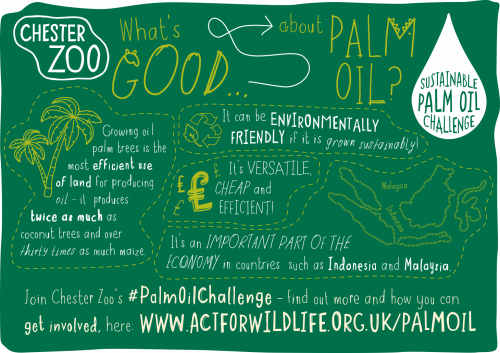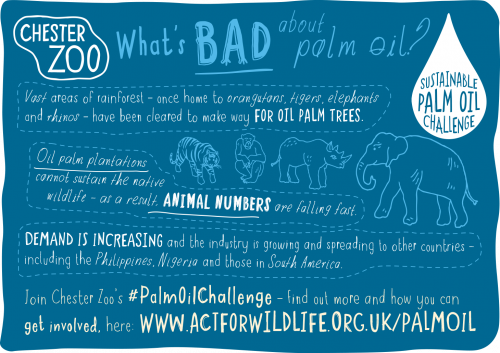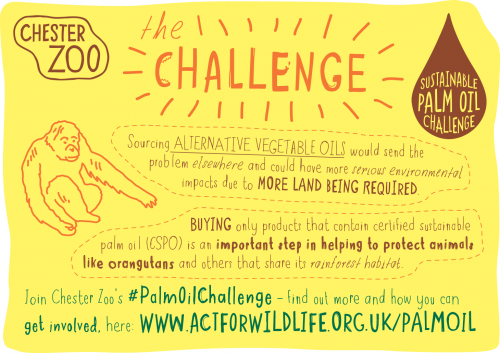Palm oil is an edible vegetable oil that comes from the fruit of oil palm trees. It’s cheap and efficient making it the world’s most widely used vegetable oil – and global consumption is rising.
Palm oil is used in the production of foods such as cake, chocolate, biscuits, margarine and frying fats. It is also found in cosmetics, soap, shampoo, cleaning products and can be used as a biofuel. Up to 50% of products in an average UK supermarket now contain palm oil!
The growing palm oil industry and unsustainable production of palm oil is one of the biggest threats facing the forests and wildlife of places like Borneo and Sumatra – and demand is continuing to increase. We can make a big difference in protecting wildlife by tackling the issue of unsustainable palm oil production.
Forest habitats are being lost, animals are losing their homes and carbon is being released into the atmosphere, contributing to global warming. We’re working with partners all over the world to promote sustainable palm oil production but we can ALL do something to make a difference.
Look through the below images to discover what’s good about palm oil, what’s bad about it and the challenge we face…
Every food product sold to the public in the UK that contains palm oil must have ‘palm oil’ listed on the packaging, however not all products state whether their palm oil is certified sustainable. That’s why we created a shopping list that contains products and brands that you can buy that have sustainable palm oil in them, which you can download and use when doing your shopping.
Below are some Frequently Asked Questions about palm oil…
PALM OIL FREQUENTLY ASKED QUESTIONS
Why is palm oil used in so many products?
- It is a very versatile oil and has different properties and functions for use in a variety of products (from soaps to chocolate). It can be a liquid or a solid which gives it an advantage over other oils.
- Its smooth and creamy texture and absence of smell make it a desirable ingredient in many recipes, including baked goods (such as biscuits), and it can be semi-solid at room temperature which is a property needed to keep butter and margarine spreadable.
- It has a natural preservative effect which extends the shelf life of food products.
If it has such a negative effect on the environment, shouldn’t I avoid palm oil and switch to an alternative oil?
- A boycott of palm oil is often spoken of as a solution to this conservation challenge. It’s important to remember however that all agriculture as an impact on the environment.
- Palm oil is incredibly efficient, and is the highest-yielding vegetable oil crop.
- Palm oil supplies 35% of the world’s vegetable oil on just 10% of the land allocated to oil crops (1).
- Oil palm produces up to nine times more oil per unit area than other major oil crops (1), so a switch to another type of edible vegetable oil (such as rapeseed oil) would require up to nine times as much land to produce the same yield. This will increase deforestation and other impacts.
- A blanket boycott of palm oil could drive the price of palm oil down. This could increase demand, especially in markets which have less interest in sustainability and are bigger markets than the UK and Europe. This reduces the incentive to produce environmentally sustainable palm oil.
- In producing countries, millions of people work in the palm oil sector. Palm oil plays an important role in the reduction of poverty in these areas. In Indonesia, over 4.5 million people earn their living from palm oil production. Stopping the production of palm oil altogether would create significant problems for these people who support their families by working in this industry.
- If we don’t demand sustainable palm oil then the producers won’t have motivation to create it – we need to be part of the solution.
What exactly is sustainable palm oil?
- There are various definitions of sustainable palm oil. Malaysia and Indonesia have mandatory standards in-country, but the most widely recognised scheme is the one regulated by the Roundtable on Sustainable Palm Oil (RSPO), a voluntary scheme.
- Palm oil produced according to these standards as of 2018, is required to be deforestation-free.
- Sustainable palm oil is palm oil grown in a way that reduces the impact on biodiversity and the environment and adheres to high standards of human rights.
What species are impacted by palm oil?
193 critically endangered, endangered and vulnerable species are impacted globally by palm oil (1). One of these animals is the orangutan, of which all three species are listed as Critically Endangered by the International Union for the Conservation of Nature.150,000 Bornean orangutans are thought to have been lost over the past 16 years, with oil palm being one of the main risks. Find out more on the IUCN website.
We say that palm oil contributes to the economy in Indonesia and Malaysia – but how true is this?
- Oil palm plantations are owned by a mixture of large companies and small holders (60% to 40% respectively). 5million people in Indonesia are employed through plantations. Palm oil is 11% of Indonesia’s export earnings (1/3 of this being small holders).
What is the UK doing about sustainable palm oil?
- The UK roundtable on sourcing sustainable palm oil, convened by the government, was set up in 2012. The initial aim was to work towards 100% sustainable palm oil in the UK by 2015. The industry made significant progress and currently 77% of palm oil brought in to the UK (crude and refined oil, not ingredients or derivatives) is sustainable.
- You can see the last report here
- EFECA (Experts in Sustainable Forests & Agricultural Advice) lead the group and carry out the data analysis and research on sustainable palm oil in the UK.
- The group still exists past the 2015 deadline and has committed to the Amsterdam Declaration for Europe to support a fully sustainable palm oil supply chain by 2020. Find out more.
- The British and Irish Association of Zoos and Aquaria (BIAZA) represent their members on this group and a Chester Zoo staff member is the current BIAZA representative.
What do other conservation organisations believe?
- The IUCN Oil Palm Task Force undertook a situation analysis on oil palm and biodiversity conservation in the context of sustainable development. The task force released itsreport in June 2018 and found that banning palm oil would most likely increase the production of other oil crops to meet demand for oil, displacing rather than halting the significant global biodiversity losses caused by palm oil. Its recommendations were for palm oil to be produced more sustainability by avoiding deforestation and cutting non-food palm oil use to reduce its impacts on biodiversity.
- In November 2019, 47 conservation organisations, including WWF, Save the Rhino and Sumatran Orangutan Society, came together to sign a joint statement in support of sustainable palm oil. You can read the statement here.
- Some conservation organisations are publicly critical about sustainable palm oil, however many of these organisations do in fact support sustainable palm oil over a boycott and are calling for better practices. Greenpeace for example are members of the Palm Oil Innovation Group, which calls for responsible palm oil production over a boycott. For more information on POIG, click this link.
I’ve heard that sustainable palm oil is a get out clause and companies are claiming sustainable use but just buying certificates to cover themselves?
The RSPO has four approved supply chain models for its certified palm oil:
- Identity preserved – the oil delivered to the end user is traceable to the particular mill and its supply base
- Segregated – the oil delivered to the end user comes only from certified sources. Oils from different certified sources can be mixed
- Mass balance – certified oil is tracked throughout the supply chain. It can be mixed with non-certified oil but the volumes of each are tracked and the correct proportions are sold as certified and non-certified
- RSPO credits – Certificate trading where an oil mill can gain credits for volumes of certified oil produced and sell these to an end used. This is independent of the physical supply chain
The ideal is that we move towards a market where all sustainable palm oil is from a physical source, either identity preserved or segregated. However mass balance and indeed RSPO credits have a place in the market. Both of these systems increase the demand for sustainable palm oil, where actual physical sustainable palm oil isn’t available and so play a role in moving the industry further towards fully sustainable supply chains.
Other organisations are saying that they’re boycotting because current sustainable palm oil isn’t good enough. Why do Chester Zoo think sustainable is ok but others don’t?
- RSPO sustainable palm oil is a stakeholder scheme, but it’s only as strong as the participants so if you remove yourself from this you can’t help to improve it. By boycotting and removing yourself from the situation, you’re not going to save orangutans on the ground, as unsustainable palm oil will still be sold elsewhere in the world where there is less of a call for sustainability (India and China are both larger importers of palm oil than Europe – 22%, 19% and 15% respectively).
- The RSPO standards moving to deforestation free was agreed in 2018, and the vote was agreed upon by members of the Roundtable which includes growers, retailers and manufacturers. The industry voted for this move to deforestation free and conservation organisation have been hugely encouraged by this.
- There have been reports of members carrying out practices against the RSPO principles and criteria. We expect the RSPO and its members to adhere to the criteria and take action when there is evidence of non-compliance.
- We will, and have done, act ourselves where necessary against RSPO members who fail to meet the standards.
What about palm oil used in biofuels, do you have a position on this?
- The IUCN oil palm oil task force situation analysis states that “To mitigate biodiversity loss, effective policies and programs are needed tostop the clearing of native tropical forests for new oil palm plantations. This includes policies which limit demand for palm oil for non-food uses (such as the new European Union policies limiting the use of palm oil for biofuel) or which protect forests and other ecosystems in producer countries.” (1)
- We would not support the use of vegetable oils in biofuels, as scientific evidence shows that burning biofuels, including palm oil, can actually release more greenhouse gases than burning fossil fuels.
1. Meijaard, E. et al. (eds.) (2018). Oil palm and biodiversity. A situation analysis by the IUCN Oil Palm Task Force. IUCN Oil Palm Task Force Gland, Switzerland: IUCN.
USEFUL RESOURCES
- Roundtable on Sustainable Palm Oil
- WWF Palm Oil Buyers Scorecard
- Conservation International and WWF US – Sustainable Sourcing Guide for Palm oil users
- Sustainable Production of Palm Oil – UK Statement (DEFRA)
- Sustainable Palm Oil – five steps to ensure responsible sourcing (CPET)
- ICUN Oil Palm Task Force – Oil Palm and Biodiversity
- ICUN Issues Brief – Palm Oil and Biodiversity
- EFECA – UK Sustainable Palm Oil Initiative
- ZSL’s Sustainable Palm Oil Platform


